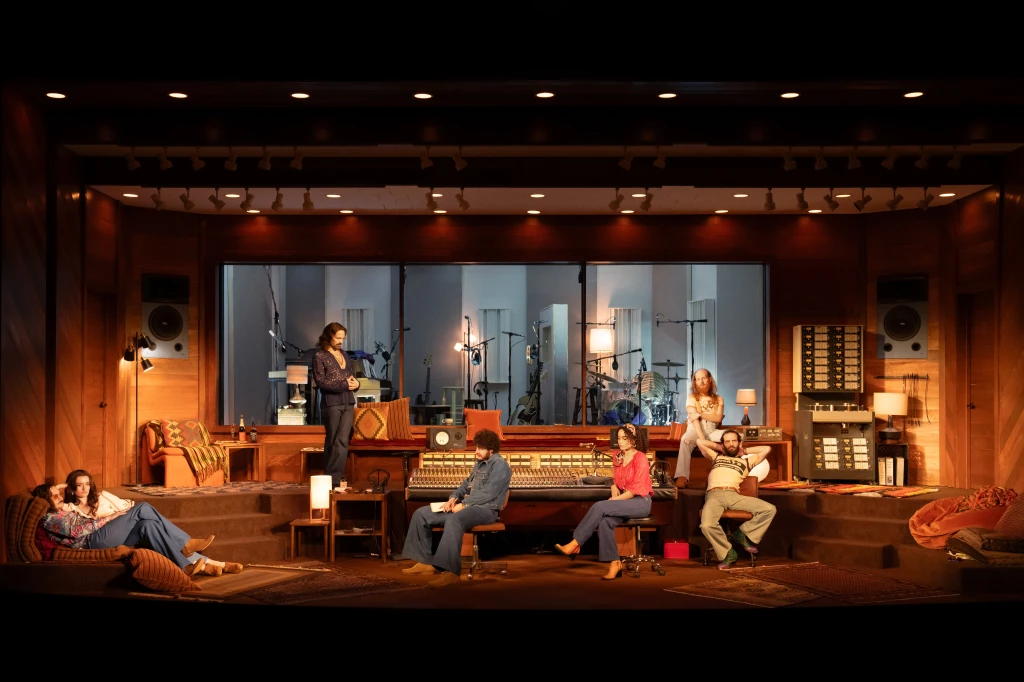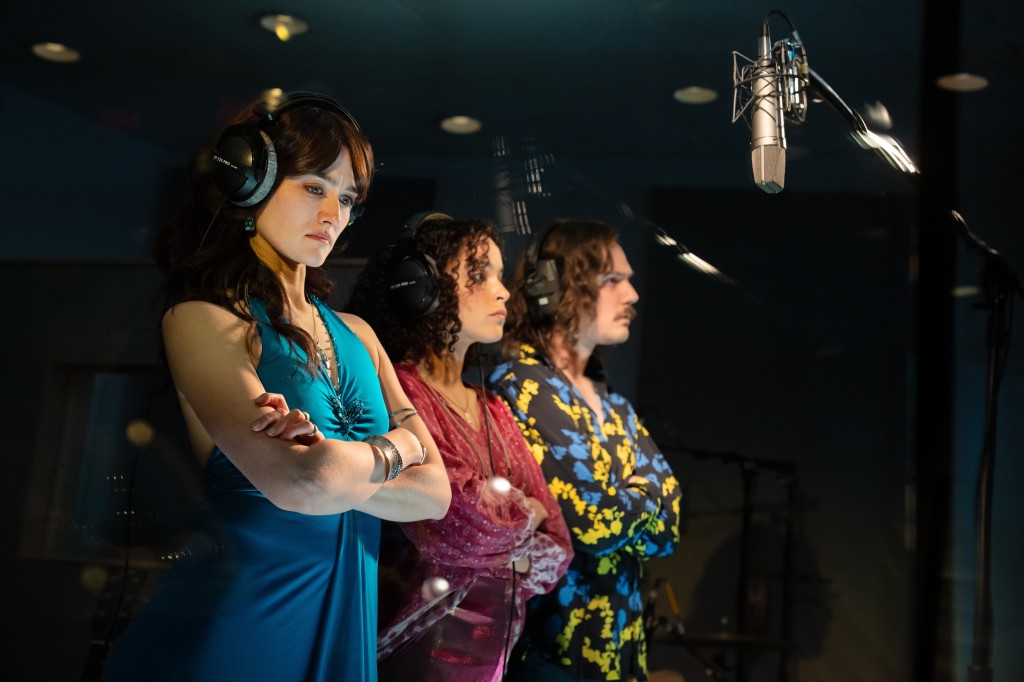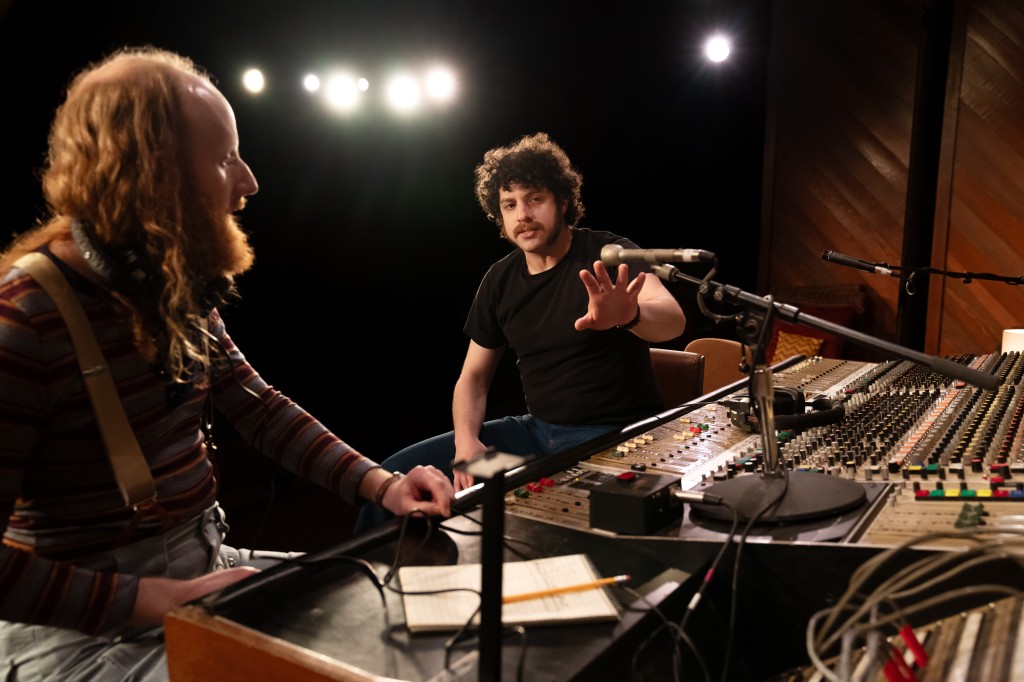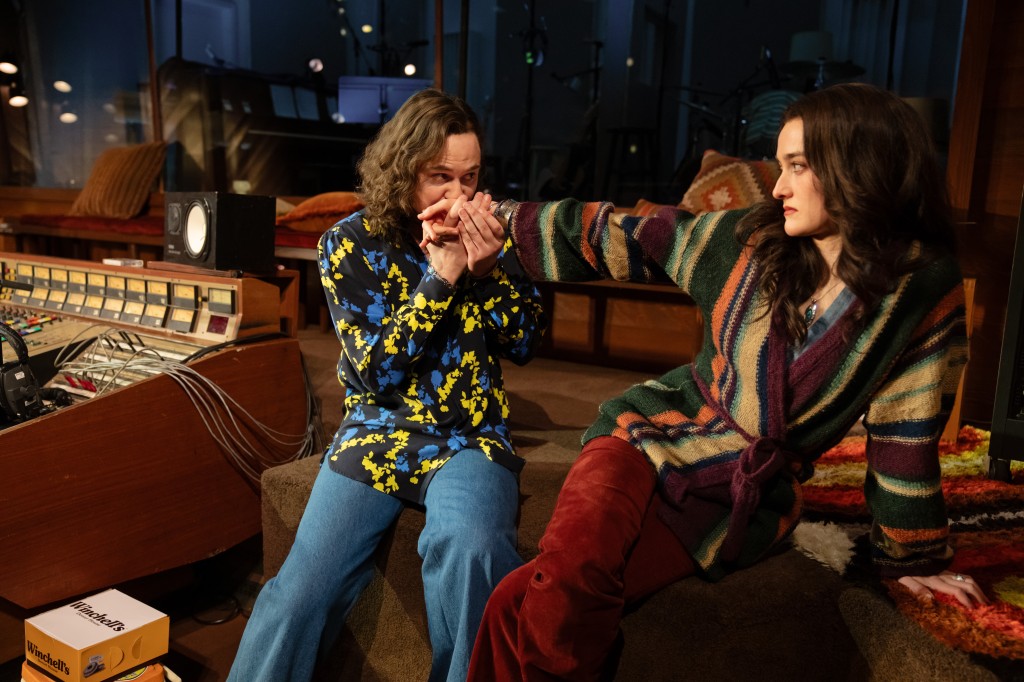Blog Archives
‘Stereophonic,’ Adjmi’s Hit Transfers to Broadway

When Stereophonic opened at Playwright’s Horizons in the fall of 2023, the hybrid comedy/drama/musical was extended a number of times for a multitude of reasons. The acting was superb. The subject matter intrigued. Who is not enthralled by a smooth rock band on the cusp of greatness with a chonky financial contract, “getting their s%$t together,” as a small privileged audience watches them record their artistry in two sound studios? Under pressure, the two couple’s relationships straining, the husband-wife partners display pustules bursting with emotionalism, and the audience sees the interior of these relationships. What’s not to love?
This is live theater at its best. The audience lives moment to moment with the musicians (we have forgotten they are actors), riding to the mountain tops and canyons as we joy to their pain of creation, producing what may be a #1 album that soars to the top of the charts. In its transfer and Broadway premiere at the Golden Theatre, the cast, music, verité style, and arc of development are the same as is the three-hour length as in the original production at Primary Stages. Bravo. It is still a must-see.

Why would playwright David Adjmi (The Evildoers, Stunning), Will Butler, who wrote the terrific original music and lyrics, and superb director Daniel Aukin muck with success? The solid, winning substance of Stereophonic is about the five-member rock band and studio engineers working at an accelerated pace to record an album at two California sound studios in the mid-1970s. We get the “low-down” perspective of what it takes to be great.
Above all Stereophonic Broadway remains a stylistic masterpiece of theater verité with a view into two separate worlds, music creation and technical engineering, without which musicianship would not exist. The meld of the two in a great album reveals the dynamic genius of technicians and musicians, though the musicians are the public face who receive all the glory.

Two points to make about the production, which is integrated and fantastic from my perspective, with one suggestion. First, Stereophonic may not be understood by a “Broadway” type audience, who might not have the patience to work through the incredible detail of “moment to moment” dialogue and complications so organically constructed, intimate and authentic, that the realistic action brings one into oneself, rather than encouraging escapism in a flight of song and dance numbers characteristic of “the Broadway show.” In its brilliance, Stereophonic may not be fully appreciated for what it is. Stereophonic is a “one-of-a-kind” original that provides an electrifying evening of music creation as one would imagine happened in iconic recording studios like Muscle Shoals Sound Studio in Alabama or Abbey Road in London, perhaps, without the histrionics.
Secondly, in its staging at the Golden Theatre, a larger venue, the sound design has to be properly figured out by the designers, and the actors. They are not in a smaller venue. The actors must project, especially when their backs are turned from the audience. The sound design must be at equal level in every portion of the theater to eliminate dead spots. In the transitioning this must continue to be fine tuned.

For rock fans and those fascinated by the ethereal nature of how bands collaborate, the Broadway production mesmerizes because we clearly understand the division between the musicians’ mystical artistry, which is always front and center, and the unseen, faceless, backstage engineering by Grover (Eli Gelb), and Charlie (Andrew R. Butler), who are finally revealed in process. It is the engineers’ artful techniques which enhance the overall effect and impact of each recorded song. This division of the two different realms of making music is beautifully manifested in David Zinn’s wood paneled scenic design, and Jiyoun Chang’s lighting design, which Aukin carried over to Broadway, along with Enver Chakartash’s period costume design. Robert Pickens & Katie Gell’s hair and wig design are new in this production.
As at Primary Stages, the Golden Theatre’s stage is divided into two sections. The upper level reveals the sound studio protected by glass, where we see and hear the musicians perform in a theater verité style, as they stop to revise tempos, add pauses, evolve riffs, etc. Downstage is the massive control panel where the engineers sit mostly with their backs to the audience and work to serve, manipulate, and stoke the musicians’ extraordinary talent and heightened emotional states, all the while discussing “their truth” with each other. With Aukin’s superior staging, we can track both worlds, feeling we are in their midst, interactively participating in music creation and understanding how the worlds precariously interact.

Though band members treat Grover and especially the shy Charlie as invisibles they don’t speak to, without their efforts the band’s unique identity and glorious sound wouldn’t exist. Therefore, in the production’s arc of development, Adjmi gradually uncovers the engineers’ centrality to the creative process and the band’s success. It is especially funny and poignant to witness how the engineers moderate the emotional infantilism of the “high-strung” musicians to get the recordings in top shape.
Throughout, drugs and alcohol become a panacea to quell the rough edges of sleep deprivation and stimulate a frenzied work environment. The cocaine, supplied by overworked engineers, keeps the band working at a frenetic pace. Ironically, drug use intensifies the arguments but floods the band’s creative juices.

Aukin’s vision of Adjmi’s themes of art, music, sacrifice and suffering, heighten the importance of sound engineers. They must have skill and expertise in the control room, as well as the personalities to cope with and manipulate artistic personas like druggy Reg (the hysterical and funny Will Brill), and diva Diana (Sarah Pidgeon).
For example Grover and Charlie must be temperate as Diana strains to get the notes, emotionally loses it, and must be encouraged by her partner lead musician and producer Peter (Tom Pecinka), to try again and again to “get it right.” Additionally, the engineers must be purposed to withstand the emotional word bludgeons from their “boss,” Peter, who launches off into a demeaning tirade against Grover and fires him. It is an idiotic move because Grover is the backbone of the album and Peter knows it. That is why he later makes Grover co-producer and apologizes.
The songs of Will Butler, (Oscar-nominated and former member of the Grammy-winning indie rock band Arcade Fire), remain as striking as ever. Indeed, one would wish that this band does produce an album, finishing the partial songs (we only hear a few in their entirety), that we hear them rehearse. The songs resonate with the themes of emotional yearning and the deceptions of fame, money and commercialism, the masquerade that they must avoid. If they embrace the commercialism, they will lose their way as artists, attempting to achieve perfection, a goal of the hard driving Peter.

Butler’s songs importantly reveal the raw emotions of anger and hurt, stirred by betrayal and loss that couples Reg (Will Brill) and Holly (Juliana Canfield), and Peter and Diana, experience in their relationships. Working frenetically together in close quarters to exceed the results of their previous album require sacrifice to be great. Peter constantly pushes them toward this. But by the conclusion as their work is finished, all have suffered for it. Simon (Chris Stack), who has been away from his wife and children for six months faces the threat of divorce and losing his family.
However, only Diana has been signed on to be a solo artist. Is the pain, suffering and sacrifice worth it for the others? Juliana Canfield’s Holly, a close friend and ally of Diana, congratulates her on this success. But we are left wondering if they will remain close or if the band will remain together to collaborate again?
A tour de force, Stereophonic runs over three hours with one intermission. Thanks to Adjmi, director Daniel Aukin, the sensational cast, whose acting chops and vocal talents are non-pareil, and the technical design team, the compelling forward momentum of the band’s creative dynamic resonates with powerful immediacy.
Special kudos goes to Music Director Justin Craig and Will Butler and Justin Craig’s orchestrations.
Stereophonic runs through July 7 at the Golden Theatre (252 West 45th Street, between Broadway and Eighth Avenue). www.stereophonicplay.com
‘Blue Ridge,’ An Examination of Soul Rehabilitation in North Carolina, Starring Marin Ireland

(L to R): Kyle Beltran, Kristolyn Lloyd, Nicole Lewis, Marin Ireland, Chris Stack, Peter Mark Kendall (foreground), in Atlantic Theater Company’s World Premiere of Abby Rosebrock’s ‘Blue Ridge,’ Linda Gross Theater (Ahron R. Foster)
How do we tell if our indignation for another’s plight isn’t our own misdirected rage that we ignore at our own peril? How is the healing process from childhood traumas that manifests through addiction to alcohol, drugs, sex and “acting out” initiated? Do those rehabilitating themselves recognize when the process evolves into wellness? How do such individuals recognize the journey to healing? Do they understand all that the arduous process entails before they attempt it? Or do they just move head on and try to change before they are ready because the culture and their anti-social behaviors demand it?
Atlantic Theater Company’s Blue Ridge written by Abby Rosebrock and directed by Taibi Magar raises these questions and many more. The play is superb, but does fall a bit short on one element, despite the fine performances by the ensemble and the excellent production values. The weakness evidences in Rosebrock’s sometimes confounding redirection of focus in examining the protagonist Alison (a nuanced, and layered performance by Marin Ireland whose accent is, at times, ill-executed because she quickly glosses over important, profound lines). Nevertheless, Rosebrock’s work is exceptional in the service of revealing themes which initiate organically from her characters and their interactions with each other, as they rehab in a group home setting.

Marin Ireland, Peter Mark Kendall in Abby Rosebrock’s ‘Blue Ridge,’ Atlantic Theater Company World Premiere, Linda Gross Theater (Ahron R. Foster)
Currently at the Linda Gross Theater, Blue Ridge takes place at a religious rehabilitation retreat in the gorgeous mountains of western North Carolina (Appalachia). Everpresent are the fundamentalist tenets of Christianity which the characters attempt to espouse and practice. There, at St. John’s Service House, the individuals who have been interviewed and accepted for placement, seek God’s love, forgiveness, joy and peace, reinforced by Sunday church, Wednesday Bible Study, meditation, outside jobs at a pool store and therapeutic group conversation.
However, the process of moving toward wellness is not as easy as it may appear with prayers and Bible work. There must be a complete revolution of one’s soul, a very tricky circumstance indeed; for what is the soul? What is sin? What is the devil? And how do Christian teachings answer psychological traumas? As a key theme which Rosebrock brilliantly reveals, dealing with trauma involves more intricate and complex understanding on a personal level for those who experienced trauma. This involves a life-long process and everyone who undergoes it won’t find any marked yellow brick road at the end of the rainbow. But a good first step is remembering and confronting the trauma alone and/or with expert guidance and love.

Nicole Lewis in the Atlantic Theater Company’s World Premiere of Abby Rosebrock’s ‘Blue Ridge’ Linda Gross Theater (Ahron R. Foster)
The characters, some with overseeing functions like Hern (the pastor played by Chris Stack) and Grace (social worker portrayed by Nicole Lewis) help others, and with empathy and service, seek to rehabilitate themselves. Those, like Alison (Marin Ireland) Wade (Kyle Beltran) and Cole (Peter Mark Kendall), who have been accepted into the program, hope to correct problems which have manifested in self-destructive behaviors. If such behaviors continue, the individuals will be sent to restrictive settings (jail or psychiatric lock up), if they do not improve and heal. Other characters like Cherie (Kristolyn Lloyd), voluntarily enroll in the program. Cherie knows her own soul’s weaknesses related to her family’s and her own alcoholism. Though she is self-aware, she is blind to her other weaknesses and these set her on a course which may lead to relapse if not confronted.
Rosebrock introduces us to the principals in the first act which largely is humorous exposition to set up the dramatic developments and the climax of the second act. The characters are representational, some with individual problems that run deep but whose cause remains unknown. Their outward issues range from alcohol and drug addictions to anger management issues identified euphemistically as “intermittent explosive disorder.”
Central to the characters’ improvement and social reconstitution is the Wednesday Bible Study where we first meet the others and Alison, a teacher who lost her way and her job because of anger management issues. Alison chose to go to rehab rather than jail for destroying her principal’s car; ironically, he also was the man she “loved.” Marin Ireland’s portrayal reveals Alison’s fierce, hyperbolic and frenetic personality which masks the underlying wounds which Rosebrock intimates but doesn’t clarify by the conclusion of the play.

Marin Ireland in Atlantic Theater Company’s World Premiere of Abby Rosebrock’s ‘Blue Ridge,’ Linda Gross Theater (Ahron R. Foster)
A word about the character of Alison, who is the linchpin of Rosebrock’s work. One wonders if the play’s dynamism might have been strengthened if Rosebrock had more clearly and with dramatic and active plot points heightened the true issues that fomented Alison’s life-long devastation. At the beginning of Act One, to introduce herself, Alison glibly races through the lines of a song “Before He Cheats” by Carrie Underwood which parallels her behavior that landed her in rehab. We understand that she refers to herself when she quotes: “by this point all the accumulated pain an’ hopelessness, an’ annihilatin degradation, uh’bein a woman in this sexual economy’ve juss… racked the speaker’s brain and body, like a cancer.”
However, we remain unenlightened about the how and the what, even until the end of the play when Wade (Kyle Beltran) confronts her with these lines. Rosebrock never delineates the specifics of Alison’s annihilation and this is key to feeling empathy for her. Though Ireland does a yeowoman’s job in getting us to Alison’s heightened emotional state, our identification with her is muted and unsatisfactory. Perhaps, this is because we do not understand why she hurts so on an individual level. It is not enough to call in the cultural memes as her revelation. The facts and specifics matter; they resonate. But what are they? Thus the fullness and the power of Alison’s emotional state and whether or not she has achieved self-realization to move on to the healing process is opaque. We are not even “seeing through a glass darkly” where she is concerned.

Kyle Beltran in Atlantic Theater Company’s World Premiere of Abby Rosebrock’s ‘Blue Ridge,’ Linda Gross Theater (Ahron R. Foster)
The play turns on Alison’s integration into the program and her recovery. The irony is that she does the work in achieving her external goals and is reinstated as a teacher. However, she doesn’t begin to expurgate the underlying morass of pain in her soul while she is immersed in her sessions and interactions with Wade, Cherie, Hern, Cole, Grace. Indeed, because her self-realizations remain superficial, she becomes the catalyst that exacerbates conflicts and escalates issues for Cherie, Hern, Cole and Grace. As Cherie suggests, Alison blows up a set of circumstances via her own projections. As a result, everything changes for the characters.
Furthermore, Alison doesn’t understand how to get around the humiliation of the negative impact she has afterward. Ironically, though “all have sinned and come short of the glory of God,” by the end of the play, we see though there are apologies, there is no closure, no forgiveness, no resolution. Each of the individuals is forced to work by himself/herself as the “family” goes its own way in separate directions.
The only one who attempts to deal with himself in an authentic way is Wade. He tries to “make amends” for his not dealing with Alison on a deeper level than he he should have. At the conclusion Wade’s conversation with her is a trigger. However, we do not understand the specifics of the how or why. The rationale appears that she went through something in childhood. So did we all. We are ready to empathize, but are never quite given the chance, a fissure in the play’s development and characterization of Alison.
Rosebrock chooses to develop the play so that the conclusion becomes Alison’s flashpoint of experiencing the pain of her buried, bleeding wounds. The play ends with her emotional breakdown as she appears to allow herself to feel on a deeper level.
This is a risky choice in developing the play.The outcome remains unsatisfying and uncertain. The character Alison, whom we’ve come to accept and appreciate, is a cipher and a conundrum to herself and us. Though Alison has achieved the beginnings of a deep emotional release, Rosebrock sets her spinning in limbo. Any epiphany she might experience is mitigated by questions and doubt. We do not know where her emotional release will take her, nor what specifically it is connected to.

(L to R): Chris Stack, Kristolyn Lloyd in Atlantic Theater Company’s World Premiere of ‘Blue Ridge,’ written by Abby Rosebrock, directed by Taibi Magar, Linda Gross Theater (Ahron R. Foster)
If we did know more about what is “driving her to hydroplane” (a wonderful symbol of her dangerous emotional state), we might have greater empathy. And indeed, if she achieved the makings of an epiphany, we would understand her. The irony is that her emotions belie victimization but we do not understand. Might that have been dramatically revealed to deepen her characterization?
Magar’s direction aptly shepherds the cast as they portray how each of the characters attempts to make their way through their own personal trials that emerge after Alison blows apart the peaceful interactions of the “family” in the second act. These conflict scenes engage us. In the confrontation scene between Alison and Cherie toward the end of the second act, both Lloyd and Ireland hit their target. Their authenticity reveals the extent of Alison’s self-absorption and her misery which spills out onto everyone in the group, especially harming Cherie. This scene is one of the strongest in the play. There are others that work equally well because of fine ensemble work, direction and staging.
Kudos to Adam Rigg (Scenic Designer), Sarah Laux (Costume Designer) Amith Chandrashaker (Lighting Designer) and Mikaal Sulaiman (Sound Designer & Additional Composition) for adhering to themes and establishing the tenor and atmosphere of the play. (The final projection is revelatory and symbolic.)
A word of caution. For some actors, the North Carolinian accents were a distraction that occluded rather than clarified. Whether this was because of character portrayal or under-projection is moot. However, because Kyle Beltran, Kristolyn Lloyd, Peter Mark Kendall (to a lesser extent Chris Stack) didn’t overrun their lines and their projection was a sounding bell, their accents sounded unforced.
The play is a worthy must-see for the performances (despite a few rough patches with accents) and for Rosebrock’s metaphoric writing, humor and intriguing thematic questions. Blue Ridge runs with one intermission at the Linda Gross Theater on 336 20th Street between 7th and 8th until 26 January. For tickets go to the website.